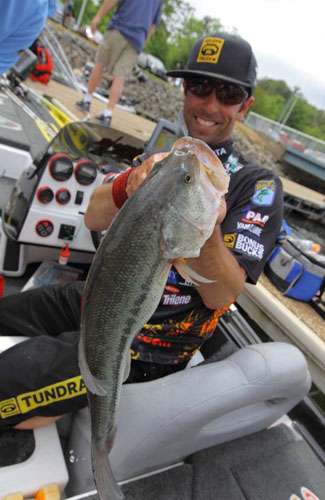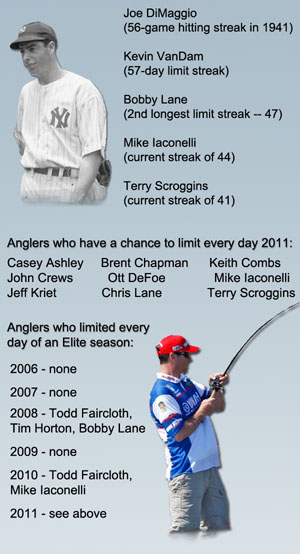
There are magic numbers in sports.
Football has the Miami Dolphins’ 17 wins in 1972. Basketball has Wilt Chamberlain’s 100-point game. Baseball has the most (and almost certainly the best), whether its Babe Ruth’s 714 home runs or Joe DiMaggio’s 56-game hitting streak.
Bass fishing has its numbers, too.
There’s Roland Martin’s nine Bassmaster Angler of the Year titles, Rick Clunn’s and Kevin VanDam’s four Bassmaster Classic championships and — the greatest number of them all in the world of bass fishing — 22-4, the weight of the world record largemouth.
Now I want to tell you about a “new” number I’ve dug up after hours and hours of scouring the Elite Series records.
I think it’s going to impress you.
The number is 57, and it’s how many consecutive competition days one particular angler brought a limit to the scales in Elite Series events. This feat started with the 2008 Lake Toho tournament and ran to the Mississippi River event in 2009, the longest such streak in B.A.S.S. competition history.
I started thinking about streaks because 2011 is the 70th anniversary of Joe DiMaggio’s 56-game hitting streak. I’ve always been a big baseball fan (go Braves!) and the numbers of that game have fascinated me since I was a kid.
If you follow it, you know the national pastime is the ultimate numbers game. Strikeouts, stolen bases, home runs, shutouts and everything else that helps to quantify and measure the game of baseball have been meticulously recorded for more than a century. Want to know who had the best career batting average with runners in scoring position and less than two outs? Just check with the Elias Sports Bureau. They know because someone was keeping track.
The high priest of baseball numbers is Bill James, a literary hero of mine. James has helped to frame the game of baseball in a way that has meaning and objectivity without losing any of its inherent elegance. If I could be to fishing what James is to baseball, well, that would be quite something.
So the DiMaggio streak and sports numbers generally have always captured my attention. I’ve always been a little bothered that more care hasn’t been taken to capture the great numbers of competitive bass fishing.

They’re out there — those numbers — but few have the inclination to collect, count and analyze them.
So when the anniversary of the DiMaggio streak came along earlier this month, I got to wondering about the bass fishing equivalent.
What is the corresponding record? When was it set? Who is the record holder?
And since B.A.S.S. records tend to be a little spotty, I decided to begin my search with the Bassmaster Elite Series, which started in 2006. Yes, there were lots of tournaments before that, but I passed on them (for now, at least) for a couple of reasons.
First, the Elite Series has clear qualification standards, and every competitor competes in every event. There’s no opportunity to “cherry pick” your tournaments so that you only compete on favorable waters or at favorable times.
Second, I believe this is the golden age of our sport — much like baseball in the 1930s, ’40s and ’50s, before expansion diluted the talent and free agency created an imbalance among teams. The Elite Series offers strong fields and challenging venues every year.
And I chose the daily limit of five bass as the standard — the equivalent of a hit in a major league baseball game. Ted Williams once said that the toughest thing to do in sports was to swing a round bat at a round ball and hit it squarely.
I guess Ted (a world class fly fisherman in his day) never fished Table Rock in the summer or the Mississippi River after heavy rains.
Just as all hits are not created equal (a “ground ball with eyes” that sneaks through the infield when your team is down eight runs is hardly as noteworthy as a walk off home run), limits have varying value, too. After all, five two pounders at Lake Falcon won’t help you make many cuts, but they show a measure of resiliency and success that’s at least as notable as a bloop single to shallow left field
I also disregarded whether or not an angler made a “cut” to fish additional competition days. Just as long as he had five fish each day, it didn’t matter whether they weighed 5 pounds or 25.
So, for our purposes here, a limit of five bass is a limit, and all are created equal just as all hits in a hitting streak are equal for the purpose of the streak.
With that out of the way, I started to speculate on who might hold such a record. After all, since cumulative weight wasn’t a factor, it might be one of those anglers with a reputation for consistency — few heavyweights, but lots of limits.
Maybe it would be Aaron Martens (he seems to catch them everywhere) or Mike Iaconelli (another guy with a reputation for finesse when things are tough). I quickly ruled out (but checked, nonetheless) anglers like Denny Brauer and Tommy Biffle since home run hitters tend to strike out a lot.
What I learned after hours and hours of number crunching might surprise you.
For starters, I confirmed that a limit is the standard in Elite Series competition. In 14,440 angler days on the water, the Elites brought 66,024 bass to the scales. That’s an average of 4.57 bass per angler day. It means the average Elite angler brings better than 4 1/2 bass to the scales at the end of each competition day.
What surprised me was that the worst of them were catching about four keepers a day while the best were very close to a limit of five.
That’s a pretty slim margin separating the best and worst — about 20 percent — but not nearly as thin as the margin between the best and worst major league hitters. After all, if a good player hits .300 and a bad one hits .200, that’s only a 10 percent difference.
And I was wrong about the anglers with a reputation for catching plenty of bass, but small ones. It turns out that the best anglers are the best anglers — whether you’re talking limits or tournament wins or any other meaningful standard. Almost all of the best anglers have put together impressive consecutive limit streaks. Some of them have done it more than once.
Which brings me back to the big question — who is the Joe DiMaggio of bass fishing?
Maybe it’s no surprise that the answer is Kevin VanDam. The man who owns most of the significant records in competitive bass fishing is also the man who caught a limit of five bass on 57 consecutive competition days between March 13, 2008 and June 12, 2009.
He’s not just catching bass that are bigger than those being brought to the scales by other competitors, he’s catching more of them, and he’s doing it more consistently than anyone else.
So, it’s official … 57 is our 56, and Joe DiMaggio was the Kevin VanDam of baseball.





